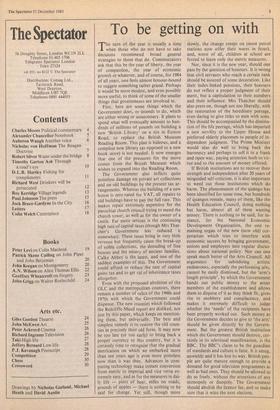To be getting on with
The turn of the year is usually a time when those who do not have to take decisions recommend broad general strategies to those that do. Commentators ask that this be the year of liberty, the year of compassion, the year of economic growth or whatever, and of course, for 1984 of all years, one feels almost honour-bound to suggest something rather grand. Perhaps it would be more modest, and even possibly more useful, to think of some of the smaller things that governments are involved in.
First, here are some things which the Government does, or intends to do, which are either wrong or unnecessary. It plans to spend what will eventually amount to hun- dreds of millions of pounds on building a new 'British Library' on a site in Euston Road, to replace the British Museum Reading Room. This plan is hideous, and a complete new library (as opposed to a new book store) is not needed. It now emerges that one of the pressures for the move comes from the British Museum which wishes to expand into the Reading Room.
The Government also inflicts quite pointless damage on private art collections and on old buildings by the present tax ar- rangements. Whereas the building of a new house is zero-rated for VAT, all repairs to old buildings have to pay the full rate. This makes repair extremely expensive for the parochial church council trying to mend the church tower, as well as for the owner of a castle. Far more serious is the continuing high rate of capital taxes (though Mrs That- cher's Government has reduced it somewhat). These taxes bring in very little revenue but frequently cause the break-up of noole collections, the denuding of fine houses and the misery of ancient families. Calke Abbey is the latest, and one of the saddest examples of this. The Government could afford to reduce the rate of capital gains tax and to get rid of inheritance taxes altogether.
Even with the proposed abolition of the GLC and the metropolitan counties, there remain a number of relics of the 1960s and 1970s with which the Government could dispense. The new counties which followed the Redcliffe-Maud report are disliked, not just by this paper, which keeps on mention- ing them, but universally. The best and simplest remedy is to restore the old coun- ties in precisely their old form. It may now be too late (or too early) to bring back a proper currency to this country, but it is certainly time to recognise that the gradual metrication on which we embarked more than ten years ago is even more pointless now than it was then. Advances in com- puting technology make instant conversion from metric to imperial and vice versa ex- tremely easy, and as for the measures in dai- ly life — pints of beer, miles on roads, pounds of apples — there is nothing to be said for change. Yet still, though more slowly, the change creeps on (most petrol stations now offer their wares in litres), and, worst of all, children at school are forced to learn only the metric measures.
Nor, Since it is the new year, should one pass by the question of honours. It is wrong that civil servants who reach a certain rank should be assured of some decoration. Like their index-linked pensions, their honours do not reflect a proper judgment of their merit, but a capitulation to their numbers and their influence. Mrs Thatcher should also press on, though not too liberally, with the restoration of the hereditary peerage, even daring to give titles to men with sons, This should be accompanied by the diminu- tion of the life peerage, which has imparted a new servility to the Upper House and preferred elderly placemen to people of in- dependent judgment. The Prime Minister would also do well to bring back the baronetcy and perhaps to sell it in a frank and open way, paying attention both to vir- tue and to the amount of money offered.
If British institutions are to recover their strength and independence after 20 years of misguided self-criticism, it is also important to weed out those institutions which do harm. The phenomenon of the quango has been identified for some time, but hundreds of quangos remain, many of them, like the Health Education Council, doing nothing but harm, almost all of them wasting money. There is nothing to be said, for in- stance, for the National Economic Development Organisation, the one re- maining organ of the new (now old) cor- poratism which tries to interfere with economic success by bringing government, unions and employers into regular discus- sions about national policy. Nor can one speak much better of the Arts Council. All arguments for subsidising artistic endeavours, especially the performing arts, cannot be easily dismissed, but the 'arm's length principle', by which the Government hands out public money to the artier members of the establishment and allows them to dispose of it as they think fit, gives rise to snobbery and complacency, and makes it extremely difficult to judge whether the 'needs' of the recipients have been properly worked out. Such money as the Government decides to give to 'the arts' should be given directly by the Govern- ment. But the greatest British institution which the Government should destroy, cer- tainly in its televisual manifestation, is the BBC. The BBC's claim to be the guardian of standards and culture is false. It is smug, unwieldy and it has lost its way. British peo- ple are quite mature enough to provide a demand for good television programmes as well as bad ones. They should be allowed to do so freely, without the attentions of any monopoly or duopoly. The Government should abolish the licence fee, and so make sure that it wins the next election.














































 Previous page
Previous page